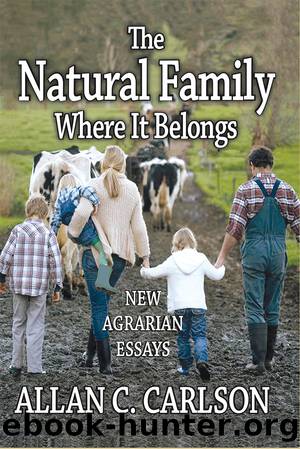The Natural Family Where it Belongs by Allan C. Carlson

Author:Allan C. Carlson [Carlson, Allan C.]
Language: eng
Format: epub
Tags: Social Science, Sociology, General, Marriage & Family
ISBN: 9781351478984
Google: aRwuDwAAQBAJ
Publisher: Routledge
Published: 2017-07-12T03:26:43+00:00
6
Wilhelm Roepkeâs Conundrums over the Natural Family
Wilhelm Roepke was an unusual free-market economist working in a difficult time. I believe that we should see him, first of all, as a product of 1914, the year which launched what he called âthe devastation on so gigantic a scale to which mankind, then having gone mad, dedicated itself.â1 Mustered to war as a young man, Roepke served in the trenches on the western front. He concluded that a civilization âcapable of such monstrous depravity must be thoroughly rotten.â Roepke pledged that if he âwere to escape from the hellâ of the Great War, he would devote his life to âpreventing the recurrence of this abomination.â He also resolved that war âwas simply the rampant essence of the state,â collectivism run amuck, and he launched his life long âstruggle against economic nationalism . . . monopolies, heavy industry, and large scale farming interests,â2 all of which he believed had given encouragement to the terrible conflict.
A second starting point for his economic views was Christian. A descendent of German Lutheran pastors, Roepke held to that concept which âmakes man the image of God whom it is sinful to use as a meansâ and who embodies inestimable value as an individual. Noting that the idea of liberty had appeared uniquely in Christian Europe, he concluded âthat only a free economy is in accordance with manâs [spiritual] freedom and with the political and social structures . . . that safeguard it.â3
The key pillar of that social structure, Roepke maintained, was the natural family. Along with religion and art, he held that the family did not exist for the state, but was âprestatal, or even suprastatal.â4 In its essence, family life was ânatural and free,â while the âwell ordered houseâ served as the very foundation of civilization.5 Derived from âmonogam[ous] marriage,â the family, he said, was âthe original and imperishable basis of every higher community.â6 The âcentre of gravityâ for planning and living oneâs life should be in that âmost natural of all communitiesâthe family unit.â7 The autonomous family also stood first âin opposition to the arbitrary tendencies of the state.â8 Indeed, the natural family at home became the touchstone of his quest for a truly humane economy.
And yet, despite this strong affi rmation of the natural family as critical to free society, Roepkeâs analysis also led him to several conundrums or dilemmas surrounding family life. For example, he avoided discussing ways in which certain incentives of a free economy might tend to weaken family bonds. Surprisingly, Roepke was also hostile both to the American âBaby Boomâ and to the new suburbs in which the young boomers lived. He criticized the creation of large families, although these were in practice a common and fairly natural product of happy home life. For related reasons, he frequently fretted about population growth. Meanwhile, he encouraged public policies that actually had pronatalist, or probirth effects. What were the sources of these conflicting views?
Download
This site does not store any files on its server. We only index and link to content provided by other sites. Please contact the content providers to delete copyright contents if any and email us, we'll remove relevant links or contents immediately.
Nudge - Improving Decisions about Health, Wealth, and Happiness by Thaler Sunstein(7692)
The Fire Next Time by James Baldwin(5431)
iGen by Jean M. Twenge(5408)
Adulting by Kelly Williams Brown(4566)
The Sports Rules Book by Human Kinetics(4379)
The Hacking of the American Mind by Robert H. Lustig(4375)
The Ethical Slut by Janet W. Hardy(4242)
Captivate by Vanessa Van Edwards(3838)
Mummy Knew by Lisa James(3686)
In a Sunburned Country by Bill Bryson(3537)
The Worm at the Core by Sheldon Solomon(3486)
Ants Among Elephants by Sujatha Gidla(3460)
The 48 laws of power by Robert Greene & Joost Elffers(3247)
Suicide: A Study in Sociology by Emile Durkheim(3018)
The Slow Fix: Solve Problems, Work Smarter, and Live Better In a World Addicted to Speed by Carl Honore(3007)
The Tipping Point by Malcolm Gladwell(2914)
Humans of New York by Brandon Stanton(2868)
Handbook of Forensic Sociology and Psychology by Stephen J. Morewitz & Mark L. Goldstein(2701)
The Happy Hooker by Xaviera Hollander(2686)
